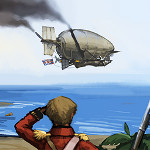|
This interview response from Tom Lehmann is interesting:quote:GP: It’s always frustrating in strategy games to sit and watch other players take their turns, but RFTG does a great job of avoiding this inconvenience through simultaneous actions. What are some considerations when designing a game with overlapping, rather than sequential, actions? From http://www.gamesprecipice.com/tom-lehmann/ The "need to eliminate open but mostly unimportant information that some players might stare at forever" seems like a design pattern that I prefer to play.
|
|
|
|

|
| # ? May 14, 2024 07:26 |
|
I'm a big RftG fan so I've read/listened to a bunch of his interviews, they're mostly interchangeable but it's worth reading at least one for his ideas on design. Other things I like in that interview:quote:Matt cares a lot about verbs, nouns, and actions. We spent a lot of time honing and simplifying the actions for In the Lab: Sequence a Disease, Process a Sample, Test Vaccine, etc. If your language is clear, it helps players visualize what they are doing. I’ve since paid more attention to this in my own games. quote:After Wei-Hwa got something working, I stepped in and noted that the first several turns were all spent doing the same thing: bootstrapping your dice pool. I asked Wei-Hwa to chop these turns. After some heated discussion, we put our heads together and came up with the faction tiles, so players hit the ground running. quote:Late in RFTG‘s development, we double-checked the pacing. We tested ending the game at either 10 or 14 card tableau sizes, to see if it would play better. We found that 12 was the sweet spot. Often a player can catch another player who would have won if the game ended at 10 cards in tableau, but the game lead rarely changed after the 12th card in tableau. These are all things I notice the presence or lack of in a design quite often now.
|
|
|
|
I'm not sure I'm up to arguing it from my phone but IMO Race for the Galaxy is going to be one of a very few all time classics in the board game genre which I regard as about as close to flawless at what it intends to do as you can get. Not saying it's for everyone or that other great (or better) games won't cover similar mechanics/design spaces, but I can't ever see myself falling out of love with it. Particularly the base set plus the latest expansion minus the orb variant. To my mind it's just a design masterpiece. I acknowledge many people don't like the iconography, but I think it is part of what enables the speed and tightness of the game once you get past it (really not a big deal for most people after one game).
|
|
|
|
Blamestorm posted:I'm not sure I'm up to arguing it from my phone but IMO Race for the Galaxy is going to be one of a very few all time classics in the board game genre which I regard as about as close to flawless at what it intends to do as you can get. Not saying it's for everyone or that other great (or better) games won't cover similar mechanics/design spaces, but I can't ever see myself falling out of love with it. Particularly the base set plus the latest expansion minus the orb variant. To my mind it's just a design masterpiece. I acknowledge many people don't like the iconography, but I think it is part of what enables the speed and tightness of the game once you get past it (really not a big deal for most people after one game). I think the main criticism you can make is it has two significant sources of randomness - being a shared single deck card game, and the blind phase selection occasionally having consequences out of proportion with how (un)predictable player choices can be. It's pretty easy to demonstrate these problems on the AI client with the undo button, every now and again I come across a situation where an unintuitive or 'bad' choice actually improves my position at game end because it causes me to draw a different set of cards from the deck or have a more efficient turn somewhere. This is mitigated by the generally short play time somewhat but it's still a flaw. It's also true that the base game is a little unbalanced strategy wise though that was apparently a conscious decision, and alien artifacts pretty much perfects the game in that respect IMO. Other than that I agree, it's a stunningly compact design both in size and play time for the depth and variety of decisions during play, and it scales brilliantly up to about 4 players (5+ is a bit weird as build phases being called becomes more common). My biggest issue with it is how difficult it makes the process of finding new games for my regular group. I imagine Dominion did that to a lot of people too.
|
|
|
|
I also think RFTG kind of sideways demonstrates some ways a Puerto Rico v2 could work, which is basically Race without the randomness/variability. For a long time I thought PR was another all time classic but sufficient games have soured me a bit - I still love it but there is no doubt that amongst experienced players one mistake in the early turns can screw you and many of the buildings are rarely worth building. On BGG there is some guy who can more or less predict who will win amongst experienced players based on the initial crop distribution and the player order. I can believe it because with experience most of the game- especially the first two turns - is scripted. In a sense this is what Race improves on for my group (and especially two player) - the randomness and variability improves on PR, plus the games are so fast I don't mind some occasional bum luck. Anyway, I feel if a bad outcome arises from the randomness, it's less often that someone gets screwed and more often someone happens to get the perfect starting hand - still very rare though and almost always with military. I think there is a hypothetical version of PR which people who like race but are unhappy with the randomness would be very happy with, but it doesn't exist yet. I'm always surprised there aren't more simultaneous role mechanic games like PR/Race/Twilight Imperium because it seems like such an under explored space compared to say worker placement (which admittedly can be very similar).
|
|
|
|
Blamestorm posted:I think there is a hypothetical version of PR which people who like race but are unhappy with the randomness would be very happy with, but it doesn't exist yet. I'm always surprised there aren't more simultaneous role mechanic games like PR/Race/Twilight Imperium because it seems like such an under explored space compared to say worker placement (which admittedly can be very similar). I'm not sure what you mean by "simultaneous role mechanic games" if you're categorizing Twilight Imperium with Race and Puerto Rico.
|
|
|
|
Active player chooses an action/role; everyone does the action but the active player gains an additional benefit. Actions reset once every player has had a turn and first player rotates. Edit: maybe I'm misremembering TI - but I think it works that way too? Race is obviously slightly different in that everyone can choose the same action simultaneously.
|
|
|
|
You have that sort of action selection in Twilight Imperium but it's not simultaneous, it's turn-based. Pocket Imperium is simultaneous though! Final Attack! rules question: what happens if you need to lose Will (from a Robeast's mutated attack) but can't? Also, once a Robeast mutates does it attack you every turn with each of its attacks, or every other turn (assuming you Hold them off)?
|
|
|
|
bakka bakka posted:Keyflower gets a lot of praise here so I decided to check it out and now I am going to make it mine. Anything I should be aware of and how vital are the expansions? Expansions are non-essential. I don't know if the "Gamer's variant" rules has been added to the base game's rulebook, but it makes the game even better (IMO) so it's worth knowing about.
|
|
|
|
I get the concept of "the game is often decided at 12 cards," but I feel that there's something to be said for ending the game the precise second it's decided. One of my biggest problems with Race is that most games are unsatisfying simply because you don't get to use the engine you create. EmiDo + Escalation is a better execution of the concept, honestly. Dissent is a powerful option that reduces the luck factor involved in coasting opponent's actions while still allowing players the versatility of doing so. Each thing you do in EmiDo advances the game state somewhat, whereas in Race you can just waste a shitload of time and actions farming the deck for your first 6-cost or the +Military you need. Takeovers in EmiDo function much more fairly and less infuriating than in Race, lacking both the stupid "a small army is game-breakingly worse than no army" idea and the absolutely terrible consequences of specifically loving a player over. Fewer steps are spent trying to get basic amenities-- the card economy of Race reminds me of the move economy of Mage Knight, except that you have to spend a majority of your turns trying to clumsily fuel your ability to even have the option of making your stupid space empire. It's not necessarily that EmiDo is that perfect of a game; it's that Race has serious flaws that boggle my mind how people can tolerate them in 2015. Unfortunately, yeah, I think Race is gonna be played for a while, because people are still playing Munchkin. A shitload. rchandra posted:Final Attack! rules question: what happens if you need to lose Will (from a Robeast's mutated attack) but can't? Also, once a Robeast mutates does it attack you every turn with each of its attacks, or every other turn (assuming you Hold them off)? 1. If any Element or non-HP Resource is brought below 0, nothing technically happens. The Minus icon resolves, but you still have 0. 2. Special Attacks resolve each Impact (each Special Attack resolves once per Impact, obviously). Resolving them does not count as Holding them off, neither does it count as a Hit.
|
|
|
|
Blamestorm posted:Active player chooses an action/role; everyone does the action but the active player gains an additional benefit. Actions reset once every player has had a turn and first player rotates. Ah, okay, yeah it does kind of have that element in it. Everyone chooses an action card and they have to activate it at some point in their turn, they get the primary and everyone else can choose to pay to do the secondary, which is either something similar but weaker or something completely unrelated. I just wasn't thinking of it in that way.
|
|
|
|
Broken Loose posted:I get the concept of "the game is often decided at 12 cards," but I feel that there's something to be said for ending the game the precise second it's decided. One of my biggest problems with Race is that most games are unsatisfying simply because you don't get to use the engine you create. Well, first I think it's not entirely fair to compare Race and Munchkin. I also think that good play in Race rarely involves farming the deck for 6-costs, it's usually more appropriate to play to your hand and either push for a fast finish (military, some rarer combinations) or develop and pump a goods engine. It's a risk/reward decision, I guess. The +military is probably more of an issue but again, you play your hand. I haven't played EmiDo to compare. I have never tried Race's takeover option, despite owning the expansion; haven't been terribly interested in it so I can't comment on that. I do feel like you are generally doing useful engine stuff pretty early in Race if you want to, but it's true that the game is usually about building your engine rather than getting to use it more than once or twice. Although, again, I think good gameplay in Race often (not always) involves a mix of a couple of strategies, which sometimes involves doing early produce/consumes for card draw or to try and take advantage of other people's actions. I think some of these things are a matter of preference rather than serious flaws; there is no denying that Race has pretty passive interaction and gives you variability at the cost of randomness, but I personally think the balance is good. I feel like the better player wins almost all the time and the stats on BGG and my personal anecdotal experience seem to bear that out. Married to the quick play time and the low politics I think it's an appropriately satisfying experience. Again, I personally think Race is a classic design and a good game because it aims to create a specific kind of experience and within those parameters delivers. When you suggest things like 'clumsily fuel your ability to even have the option of making your stupid space empire' I think you're being too hyperbolic; you can play the majority of cards in the game your first turn, depending on how much you're willing to sacrifice to do so. I play RFTG fairly quickly though so I do feel this may be something of a matter of personal preference rather than design flaws - how satisfied you or I am about the 'engine' you may have created versus simply the elements you put down is OK to vary, right? (eg. if I find it satisfying to place a valuable production world but you don't find it satisfying until it produces a good which is subsequently sold, this probably isn't an objective flaw?) That having been said, I should check out EmiDo if you think it's comparable but better; it might change my opinion.
|
|
|
|
Okay, rant time. I have a kitty on my lap and I'm not going anywhere for a while. Neither are you, so grab a Snickers. History: My infamous "I hate myself for the Galaxy" rant from 5 years ago, I apologize for some of the euphemisms So, I've played a shitload of Race and I've lodged some serious complaints about Race. I'm a better game designer now than I was before, and I have better taste now than I did before. What can I say about Race for the Galaxy in 2015 that hasn't already been said?
I don't have paragraphs for the other things. Race has a really short setup time. Whoopee! All Shared Single Deck Card Games do. Welcome to every card game before 2009. It's a tableau builder. I love tableau builders! It says something that a ton of the games I've made (off the top of my head, Final Attack!, Power Up!, Fender Bender, Singularity Engine, Moonbase 1989, M*E*T*A*L, Silicon.Diver, Grid Sphere, The Dream We Shared, Clone Stamp, Castlemania, and at least 3 iterations of 100% Historically Accurate Ceasar Simulator) were tableau builders. There aren't enough tableau builders. Race has a strange quirk where it fucks up a lot of things it does well. Does that make sense? The best example I can conjure is from my old rant where I say the game is both too long and too short. Race is so short that you can't actually get a satisfying play experience, but the game is often decided well in advance of the ending. Race handles different Military and Civilian resources elegantly, but the actual card variety in the deck clashes so much as to undo all the elegance. Race provides guaranteed starting cards that are just as varied and clumsy as the rest of the deck. Race is full of different strategies and play styles but the game selects one that you get to do. Race keeps discards secret so somebody can't lock you out of 6-costs but leaves facedown cards everywhere which might inadvertently lock you out of those same 6-costs for a shuffle. Race is a fiscal conservative that wants a bigger military. In short, I think Race will come up occasionally in conversation once every couple years, but it won't be considered a classic. It came out against Dominion which itself did a huge amount of damage to the S1DCG (what a mouthful) genre as a whole just by providing an alternative. edit: Son of a bitch! A post happened while I was posting! Blamestorm posted:Well, first I think it's not entirely fair to compare Race and Munchkin. I also think that good play in Race rarely involves farming the deck for 6-costs, it's usually more appropriate to play to your hand and either push for a fast finish (military, some rarer combinations) or develop and pump a goods engine. It's a risk/reward decision, I guess. The +military is probably more of an issue but again, you play your hand. I think that the best way of putting it is that, in Race, you spend a great deal of time getting cards to do a thing. Have this quote: Broken Loose posted:Compounding this problem are a high number of "universal" cards in the deck that don't adhere to a specific strategy, choosing 2 or maybe even all of them, which means you could get hands with no right answer. At this point, you're holding Space Marines, Investment Credits, Deserted Alien World, Trade League, and Tourist World while your opponent is in the middle of some sick Alien combo you never thought possible. What the gently caress do you do? Your tableau looks like Marshmallow Alpha-Bits it's so loving mixed up, but that's only because you're desperate to burn through cards to find something meaningful. You gotta Explore+5 for cards to tell you what you're allowed to do this game. You gotta spend a bunch of cards to play a card. You gotta trade cards to get cards to spend on other cards. Cards get glorified and subsequently (and bizarrely) devalued as this agonizing means to an end. You farm more cards from the deck that you never have the remote intention to play than cards you actually want. "Cards" lose meaning just like the word is losing meaning the more I repeat it, and you're like "UGH I gotta get some bullshit to do this bullshit so I can have more bullshit." It's an engine builder with no jackpot. You gotta Produce for a turn to Trade for a turn to get poo poo you wanna do! That's 2 turns of setup to get poo poo you're gonna throw away! And if you're doing a VP engine, speed is of the essence, so you're stressing out in a bad way trying to find a way to optimally pay for the exact things you need before the opponent gets through enough of his tableau to make your journey meaningless. VP engines in Race are like a minimum wage rent-paying simulator. Military parades, as demonstrated by how dominant they were in base Race, are a dice-rolling simulator where you try to see how often you can roll a 2 or higher. If you roll a 1, you have a really poo poo time and it doesn't feel like you deserved it. Sometimes, you just arbitrarily win and it doesn't feel like you deserved it. Engines aren't inherently bad. Dominion is based around engines and I love it. I love producing goods so I can ship them for VP. Race's engines require a huge amount of ingame actions to power at a basic level, and the only way to mitigate any of that is through a gigantic amount of luck. That's not a good game feel. Your players should be like, "gently caress yeah!" when they do a thing, like when they draw a ton of money and buy an expensive card in Dominion, when you annihilate Volkare's entire army in a single turn, when you get 3 Royal Favors from King Philip in a single turn through a gigantic cluster of castle-building, or when you capture the Paladin without losing any tiles. Race has bad game feel due to how much effort it takes to advance the game state. Big rewards basically don't exist (I can only think of like 3 cards that qualify, all of which are impractical), medium rewards take 3-4 turns to pay for, and small rewards still take multiple turns to achieve (which is unacceptable). On top of that, the punishment in Race for a bad turn prediction is that you occasionally lose a turn, which exacerbates this issue. EmiDo doesn't have engines per se, but it has a definite tech progression where you absolutely get better at everything all the time with everything you do in very meaningful ways. All the actions that take multiple turns like getting new worlds and Producing goods have big jackpot payouts. Every turn, you get a new card that YOU specifically wanted and not just as a blank-faced currency to be thrown away. When you make a bad prediction of an opponent's turn, your options grow on your turn. When you make a good prediction, you sacrifice options on your turn for an extra jackpot payout. It's tighter, it has better feedback, and you actually feel like you're in control and making your own choices. Race lacks all of these. Broken Loose fucked around with this message at 10:21 on Mar 5, 2015 |
|
|
|
Just finished a game of Argent that took 3.5 hours with four players. Holy poo poo, do not play this game with anyone who has AP. To be fair, I took a while on some of my turns, but yeah, the sheer number of options is overwhelming at first. It was a really fun game even though I got 7/12 votes. The other players didn't contest me hard enough on IP, and nobody was very aggressive (it helped that I had two very powerful reactions to dissuade people), and about 4 of my points were taken because I was tied with my opponents (which if I had to break ties manually I could have, so I would have lost 3 votes had I not had the most IP). I felt really bad for one of the players, since he didn't get any marks out past the initial one and never grabbed a supporter the entire game. He did get some legendary spells and had a terrifying setup, but I was able to duck my head enough to avoid a lot of trouble from the people obsessed with killing each other. One thing I would highly recommend is a variant mentioned in Watch It Played - for the first game start each player with one mage of each type instead of drafting. It did up the amount of AP going on, but I think people really liked having access to all of the options. Subsequent games will involve drafting though.
|
|
|
|
Broken Loose posted:1. If any Element or non-HP Resource is brought below 0, nothing technically happens. The Minus icon resolves, but you still have 0. Oh good, this time the rules mistake went against us (we took the excess Will off of HP). It seemed we would lose in the Final Stage (3-player, Difficulty 7), but when planning in the penultimate Impact I was looking up Crushing Generic systems and noticed that systems could also be forced offline (even if not Generic), giving us enough energy to get by.
|
|
|
|
I don't think I've ever disagreed with a post more than Broken Loose's views on Race for the Galaxy. First of all, some things I would agree on: The Brink of War is a bad expansion that stretches the game past its design limits. The deck is too big and prestige is too snowbally. Takeovers aren't great, I don't play with them. The rest is either IMO personal feelings expressed as gospel (I find the game length, variable pace and engine building/running aspects of RftG to be just about perfect and satisfying as hell, so do many others) or stuff that sounds like it came from a total newbie, not someone who's played hundreds/thousands of games. This being the most egregious example: Broken Loose posted:Military parades, as demonstrated by how dominant they were in base Race, are a dice-rolling simulator where you try to see how often you can roll a 2 or higher. If you roll a 1, you have a really poo poo time and it doesn't feel like you deserved it. Military is intentionally slightly weak in the base game. Tom Lehmann posted:What I had observed (and confirmed after publication) is that new players often start out doing military settlement strategies (as these are easily grasped), then gradually discover produce-consume strategies before moving to a more flexible play style centered around produce-consume, but also encompassing military and development paths when indicated. This is borne out by statistics from online play: New Galactic Order and Runaway Robots are the only particularly strong military cards and only NGO really requires an investment in military strength. Your comments about dice-rolling and needing to find a card to let you play are severely at odds with my experience of the game and everything the top players say about how to play it. Explore +5 is rarely a good choice until you already have card flow established, it is most effectively used to increase the quality of a large hand of cards when you don't want to call a specific phase. The other major use is rifling through the deck for high-value military cards (especially worlds) - which you shouldn't be doing unless you're fairly certain you have access to the required military in the first place. One thing I find players get wrong all the time is the idea that starting with +1 military and some 2+ defense worlds in their hand means they have a military strategy and just need to find a +military dev. If you have only some of the pieces of a strategy in Race then you don't have that strategy. 3 blue production worlds is not a strategy until you've found the consume powers. 6+ military is not a strategy until you have a hand stocked with high defense worlds for the end-game settle rush. That doesn't mean the cards you have are worthless, a single world settled or development placed can be useful without locking you in to anything in particular until you've given yourself more concrete strategic options. Race is primarily about flexibility, resource generation and tempo - I agree that often it feels like a strategy finds you, not the other way around, but this doesn't mean you're impotent before that happens. I also dispute that 6-costs are the key here, at least to the extent you claim - they're obviously important but very few of them have powers that you really want in the early/mid game (galactic federation is the exception and by far the strongest card in the game) and good play usually leaves you with a tableau that can benefit from multiple 6-costs. I'm not even going to touch "race makes all the decisions for you" because I can't imagine how you come to that conclusion ever. I have a hand with 6 cards I want to play and 4 phases I want to call every loving game, and most turns are only a little easier than that. I generally respect your opinions on game design quite a bit and I don't like bringing people's mastery of a game in to question but I just don't understand a lot of your criticisms here. I don't think anyone would dispute that the occasional god or useless hand happens in Race but I find them to be pretty rare. Alien Artifacts in particular is strategically well balanced and 'hybrid' strategies that take advantage of a different colours, small amounts of military or development power are competitive options. Having said all that you've given me more incentive to try out Eminent Domaine some time soon. Bubble-T fucked around with this message at 14:41 on Mar 5, 2015 |
|
|
|
I'm pretty sure you need the expansion for Eminent Domain, because the base game felt like half a game the first time I played it. It was really strange how it felt like something was missing the whole time.
|
|
|
|
Race felt to me like a casual game for non-casuals. It's like Dominion, if you only ever played the starter kingdom and everyone started with an action card already in their deck. You just draw cards until you figure out if you're doing military or production, then fish for the cards you need to support that strategy. In Dominion, it's interesting because you have a different card set and therefore different strategies to find every game. In Race you might pick up different cards (brown, blue, rainbow), but the strategies are always the same simple steps. I guess I can see how Eminent Domain could be better with more deterministic additions to your deck, but it still looks like a game where you pick a strategy at the beginning and then just fish for opportunities to advance it. I'd like to try it, though.
|
|
|
|
quote:I'm pretty sure you need the expansion for Eminent Domain, because the base game felt like half a game the first time I played it. It was really strange how it felt like something was missing the whole time We sold Domain before the expansion, so I can't comment on that, but the base game certainly felt "not quite there". There's a lot of good ideas in the game, but it would have felt a lot more "finished" if there had been more varieties of viable strategy, if more of the "focus on X" strategies worked. After we were basically competent, I played 4 or 5 games in a row trying to make a "produce/trade" focused strategy work. In a couple of the games, things went pretty well for me (in terms of maximizing my efficiency), but I still finished far behind people who did the normal varied/tech-heavy build. Even with more than one person going heavy trade to try to rush an end, the traders never got a win (and often finished far back). Similarly, trying to flip a ton of planets seems like something that should have been viable, but it doesn't have enough point support. In the end, there's some choice in what specific stuff you get, but the viable strategies all seem to have a similar flavor - and, worse, "what works" doesn't change from game to game, because there isn't enough variety to the opening positions. That's not to say there isn't strategy to playing Domain, but there isn't much room to successfully explore really different plans.
|
|
|
|
jmzero posted:We sold Domain before the expansion, so I can't comment on that, but the base game certainly felt "not quite there". There's a lot of good ideas in the game, but it would have felt a lot more "finished" if there had been more varieties of viable strategy, if more of the "focus on X" strategies worked. After we were basically competent, I played 4 or 5 games in a row trying to make a "produce/trade" focused strategy work. In a couple of the games, things went pretty well for me (in terms of maximizing my efficiency), but I still finished far behind people who did the normal varied/tech-heavy build. Even with more than one person going heavy trade to try to rush an end, the traders never got a win (and often finished far back). Similarly, trying to flip a ton of planets seems like something that should have been viable, but it doesn't have enough point support. The expansion (+ mini planet expansion, which comes with the full version) addresses almost everything you've complained about here: the planets are better and more interesting, the scenario cards are literally one of the best things I have ever seen, and military DOES something. Seriously, get the expansion, it's amazing.
|
|
|
|
Broken Loose and gang, how do you feel about Glory to Rome and/or Innovation? Elements of this discussion, particularly those revolving around the randomness of single shared deck games, remind me of this Agricola review by the Tao of Gaming guy: quote:I’ve played several times now. How many? Well, that depends on how you count. I’ve played four games by any definition. Another four ‘to my satisfaction’, but I suspect most readers will only count one or two of those. “To my satisfaction” means (in this case) that everyone agreed on who would win if the game was played out. Most of these were quickly adjudicated between the first and second harvest. https://boardgamegeek.com/thread/307192/tao-gaming-review Basically, single shared deck games would be really bad if judged on a single game basis. But if you look at it over 10 games (or some long period of play time), the randomness tends to flatten out. While, other games might be much less random but will play very similarly over 10 games. For example, playing 6 hours of family variant Agricola with the same folks would definitely establish the better player and also bore the poo poo out of me, while I could do 6 hours of race w/ AA no problem and I'm certain the better player would be established, earlier than 6 hours for sure. Same goes for poker and chess. I like both. 1 game of chess is usually going to be much more interesting and fulfilling than one hand of poker. Playing chess repeatedly in one sitting against the same opponent is not for me, but I can play poker at the same table for hours. I suspect that this preference is not uncommon. A big factor in all of this is play time. My feeling is that it is a balanced equation: as randomness that impacts victory goes up, play time needs to go down. You need to be able the brute force the randomness into submission with multiple playthroughs *Tao guy still thinks the cards in Agricola are imbalanced but it no longer bothers him and he rates it a 9
|
|
|
|
fozzy fosbourne posted:Basically, single shared deck games would be really bad if judged on a single game basis. But if you look at it over 10 games (or some long period of play time), the randomness tends to flatten out. That doesn't always lead to good experiences though. If all 10 games were swingy blowouts, I won't care that it averaged out to good statistics, because I didn't enjoy any of the ten games.
|
|
|
|
Honestly though gently caress you if you're not drafting in the 'gric.
|
|
|
|
Impermanent posted:Honestly though gently caress you if you're not drafting in the 'gric. Honestly, gently caress you if you're playing Agricola instead of Caverna.
|
|
|
|
JoshTheStampede posted:That doesn't always lead to good experiences though. If all 10 games were swingy blowouts, I won't care that it averaged out to good statistics, because I didn't enjoy any of the ten games. Yeah, I think that might be an example of a game where the magnitude of randomness takes skill out of the equation. It doesn't matter how many games we play of Rock Paper Scissors, it's going to suck rear end. I really think it's a balanced equation with different linked variables that all have to be balanced as the magnitude of one changes. Another counter to swingy randomness is betting and continuity between games. Poker is swingy as hell, but a master will extract much more money out of a table than a novice over the same 10 deals. It would be neat if more games experimented with continuity between short games.
|
|
|
|
Impermanent posted:Honestly though gently caress you if you're not drafting in the 'gric. I'd actually rather not make Agricola longer, thank you very much.
|
|
|
|
quote:*Tao guy still thinks the cards in Agricola are imbalanced but it no longer bothers him and he rates it a 9 This sounds a bit off, but it makes sense. Assuming you're drafting (and you have to be drafting to be actually playing Agricola), the cards don't have to be balanced within any kind of tight range for the overall game to be balanced. Drafts don't work as well if your cards are a consistent power level; you want imbalance. Having imbalance in power levels accentuates skill of drafting. And it's not remotely just a matter of knowing the "best" card from every pack and hoping that you, say, got a better first pick than everyone else. Agricola's design forces some balances in what you need to do during the game, so your deck needs to have a variety of options and parts available. It's largely the same as a Magic draft (in a good format): yes it helps to open some bomb rare, but you'll win more drafts if you pay close attention to your mana curve, deck balance, and potential combinations. You also get rewarded well for identifying what might be expected to wheel, or how early picks are likely to affect in-game balance (and, because you're all playing in the same game, this is one thing that's even more rewarding than a Magic draft). Like, if there's a couple strong options in the occupations for getting fields (eg. Field Watchman), you can be confident that an otherwise strong plow or harrow might wheel (make it around the table); and you might also know that "Take a Grain" will be hotly contested while "Plow" might be easy to pick up late. Conversely, if there's a shortage of "free improvements" (no cost/just food cost/low prerequisites), you'll often want to take even a poor option early to avoid having a no-play growth/starting player at some point. Agricola. So good.
|
|
|
|
fozzy fosbourne posted:Yeah, I think that might be an example of a game where the magnitude of randomness takes skill out of the equation. It doesn't matter how many games we play of Rock Paper Scissors, it's going to suck rear end. Another counter is a high skill ceiling. Even ignoring the deck of cards Twilight Struggle is actually very random, where the result of a coin flip can easily cause a 6-8 VP swing.
|
|
|
|
fozzy fosbourne posted:Yeah, I think that might be an example of a game where the magnitude of randomness takes skill out of the equation. It doesn't matter how many games we play of Rock Paper Scissors, it's going to suck rear end. This isn't addressing your point (which I understand very well) but I'm going to use Rock Paper Scissors to bring something up. You might not enjoy Rock Paper Scissors because it's not exciting (to humans) but it is not necessarily a random game  It can be played that way of course but when played over many turns it is possible to strategize to exploit whatever decision-making is being done by your opponent. Or be exploited yourself. RPS as a "who can better outguess their opponent over extended iterations" game theory thing can be pretty interesting. It can be played that way of course but when played over many turns it is possible to strategize to exploit whatever decision-making is being done by your opponent. Or be exploited yourself. RPS as a "who can better outguess their opponent over extended iterations" game theory thing can be pretty interesting.This might make you think that the optimal strategy is to play a random move, which cannot be predicted and therefore cannot be exploited. While true, it's inherently limiting as a strategy and can never dominate. Random is limited to winning 1/3 of the time, and prevents you from exploiting a weaker, more predictable opponent.
|
|
|
|
Yeah, I think interesting to study is different than interesting to play :P
|
|
|
|
Bubble-T posted:It's also true that the base game is a little unbalanced strategy wise though that was apparently a conscious decision, and alien artifacts pretty much perfects the game in that respect IMO. Some people are talking big about Alien Artifacts. I've only played RftG with the non-AA expansions. Can someone expand on what makes it so great? (I assume most people don't play with the orb mini-game thing). I love Race but I don't think I want to buy 5 boxes or whatever, if AA makes it a complete awesome game then I'd love to buy just the base game and AA.
|
|
|
|
EvilChameleon posted:Some people are talking big about Alien Artifacts. I've only played RftG with the non-AA expansions. Can someone expand on what makes it so great? (I assume most people don't play with the orb mini-game thing). I love Race but I don't think I want to buy 5 boxes or whatever, if AA makes it a complete awesome game then I'd love to buy just the base game and AA. If you like Race, you'll like the AA cards. My favorite way to play is either Base+Gathering Storm or Base+AA.
|
|
|
|
fozzy fosbourne posted:I know they are pretty different, but care to compare and contrast? I know the criticism of Core Worlds is the shared random market row thing. I'm not totally against that since it seems not that dissimilar to shared deck card games and I play and enjoy a bunch of those, but those usually benefit from being able to be played really quickly so you can brute force out the randomness over many plays. Not sure about that with Core Worlds. Then again, I've read elsewhere that Core Worlds has a bit more tactical playing of cards from your hand than the average deck builder (which are usually focused purchasing cards and then vomiting your whole hand onto the table every time your turn comes up). And that sounds appealing. I've also read both games described as someone's favorite game in a few different places, so .. yeah. We tried Emdo with the expansion and found the expansion not to do much, the game was still as boring as it was previously. And I even went out and bought Emdo a second time with the expansion because of all the praise from people I trust! Still a snooze fest. Core Worlds is not the end all be all, but I found the choices both more obvious and more interesting. I guess before I give up on EmDo entirely I should watch more vids or something. Argent is holding up well. Hopefully today we will play our first all B side game and then hopefully soon we'll add in the expansion. It's a really good thing that my son and his dad like it because some of my other friends don't care for it. Either too much to think about or too much confrontation/chaos for them.
|
|
|
|
If you're never gonna play orb, get TGS. Goals are really good.
|
|
|
|
Echophonic posted:If you like Race, you'll like the AA cards. My favorite way to play is either Base+Gathering Storm or Base+AA. Agree with this. Base + AA or Base + TGS are pretty much all you need, get the other if you want some more variety.
|
|
|
|
Also the RftG Xeno expansion comes out this year and that's standalone, too.
|
|
|
|
Poopy Palpy posted:I'd actually rather not make Agricola longer, thank you very much. Agricola is long? Agricola is like, 20 minutes/player once everyone knows what they're doing. Drafting is maybe 15 extra minutes.
|
|
|
|
admanb posted:Agricola is long? Agricola is like, 20 minutes/player once everyone knows what they're doing. Drafting is maybe 15 extra minutes. You are shortchanging it, Agricola is closer to 30 minutes a player. It certainly isn't the longest Euro, but it sure as poo poo isn't 20 minutes per player
|
|
|
|
You may need Plano.
|
|
|
|

|
| # ? May 14, 2024 07:26 |
|
Madmarker posted:You are shortchanging it, Agricola is closer to 30 minutes a player. It certainly isn't the longest Euro, but it sure as poo poo isn't 20 minutes per player I mean, if you have someone who is doing nothing but restocking the board and count them as a player, I could see 20/player.
|
|
|
































